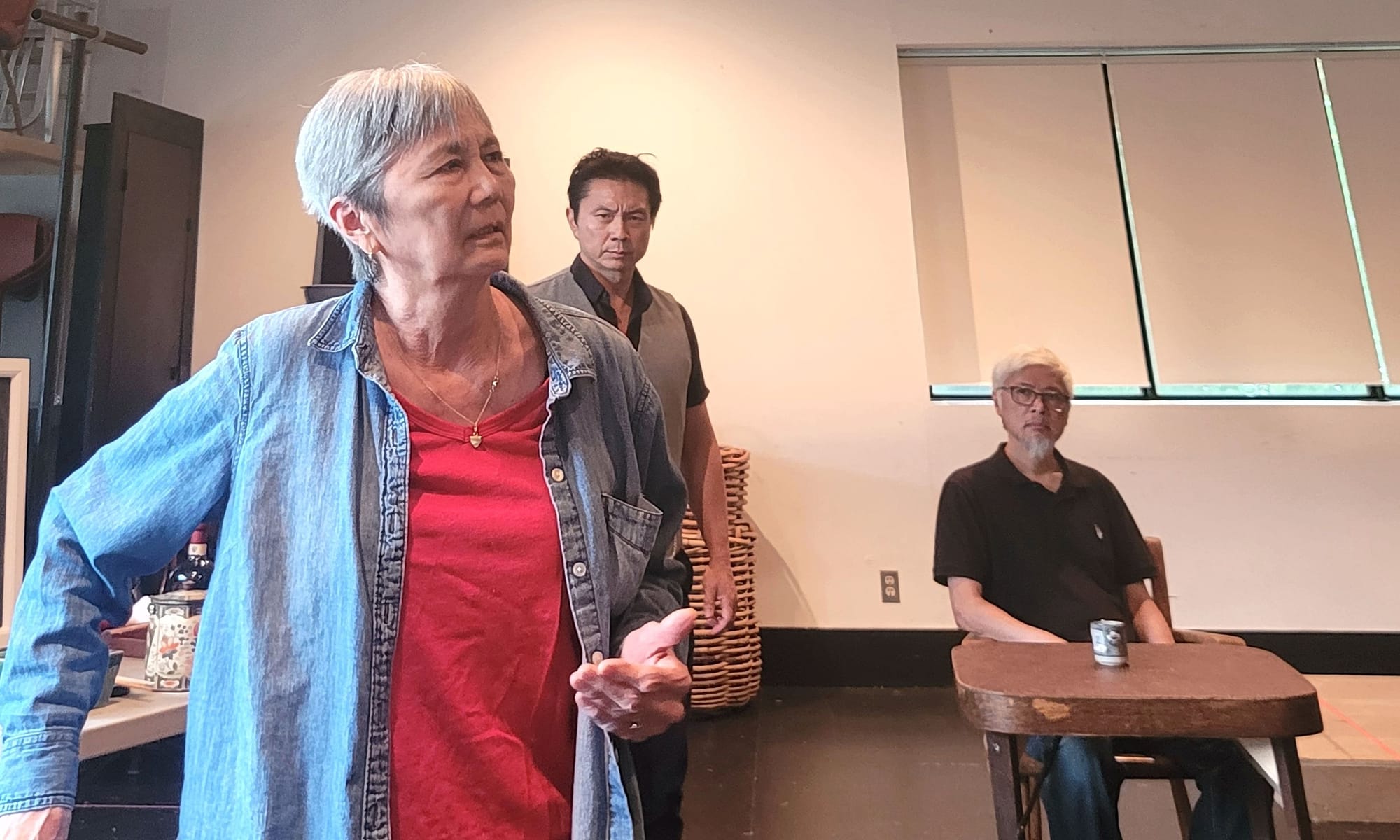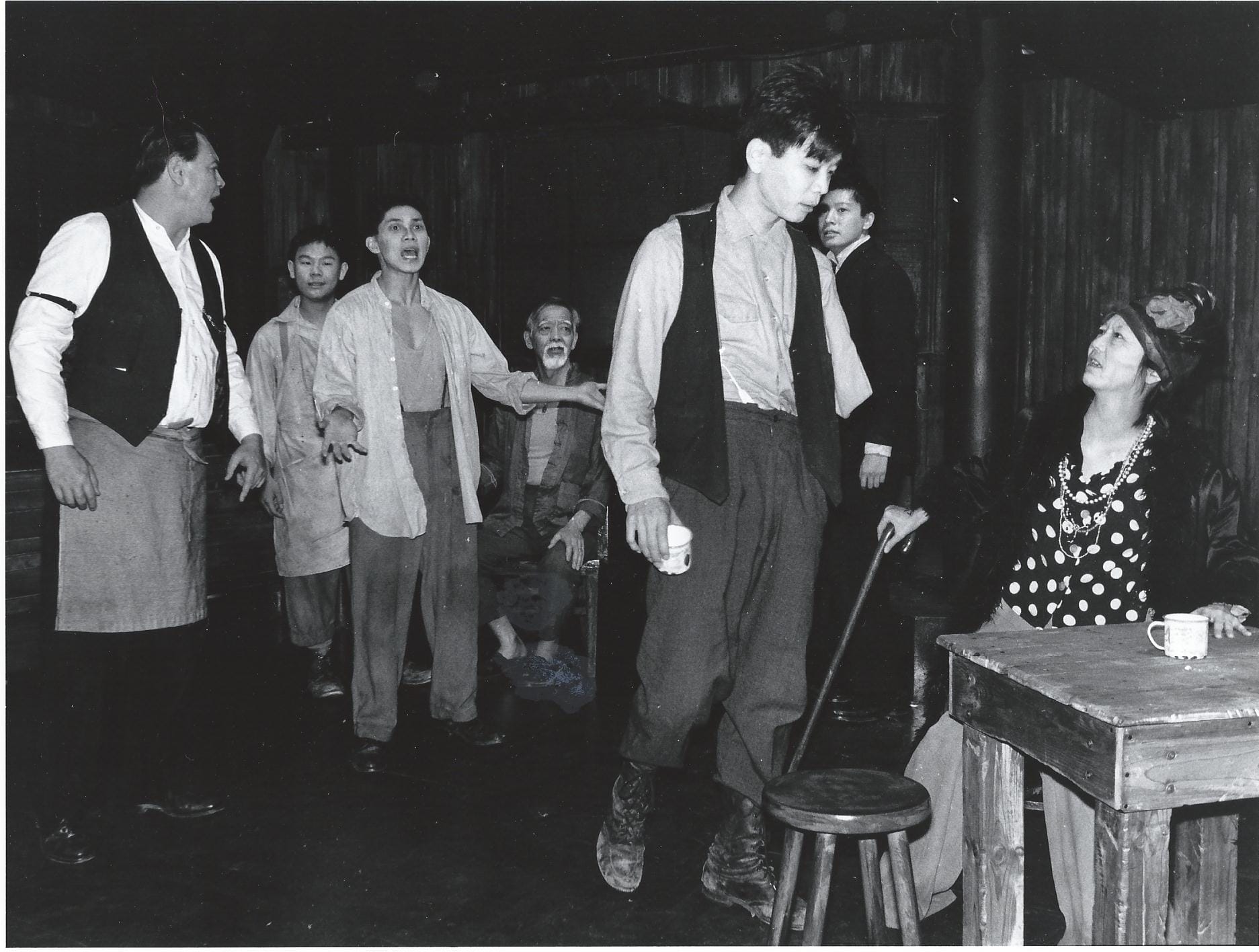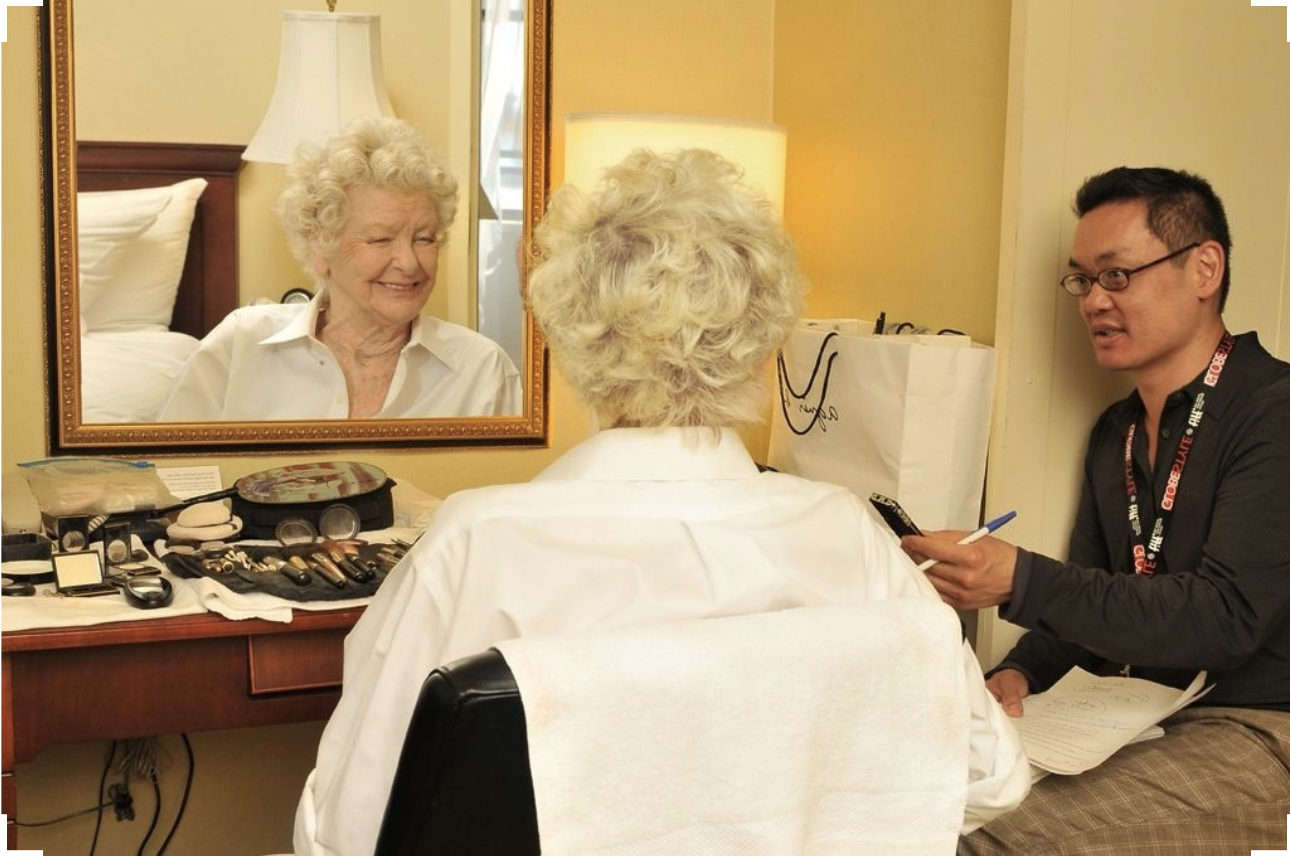Bringing historic Asian-Canadian play Bachelor Man back to the stage
Veteran theatre artist Brenda Kamino co-directs and performs in Winston Kam’s play more than 30 years after she starred in the premiere

Nearly four decades ago, in 1987, first-time playwright Winston Kam’s Bachelor Man premiered at Theatre Passe Muraille, directed by an emerging artist named Peter Hinton (now Peter Hinton-Davis).
Set in 1929 in Toronto’s Chinatown, it’s about a marginalized group of people: men who came to Canada from China, mostly to build the railroad. The Immigration Act of 1923 (repealed in 1947) prevented Chinese women and families from joining them in Canada, and so they formed a so-called “bachelor society.”
The characters include a disabled World War I veteran, a gay man, and a mixed-race man, as well as two women, one of whom, known as Queenie, is an elderly “bag lady” and sex worker.
For that first production, pioneering theatre artist Brenda Kamino (Naomi’s Road, Rashomon) played Queenie, even though she was several decades too young for the role. Now she’s back in a new production mounted by Renaissance Canadian Theatre, which is devoted to giving Canadian scripts second chances.
As well as performing in the play, which also stars Sean Baek, Robert Lee, Oliver Koomsatira, Micah Chu (replaced because of an injury by Damon Bradley Jang), Renée Wong, Ziye Hu and George Chiang, Kamino is directing (with dramaturg Diana Belshaw) and adapting the work.
We talked last week by Zoom about the play’s importance, its original reception, returning to a role after more than three decades, and how far Asian-Canadian theatre has come since then.
What made you think of bringing back this play? It was included in the 2009 anthology Love and Relasionships: Vol. 1, edited by Nina Lee Aquino, but I’d never heard of it before.
Over the years, I’d talked about the play a lot, but Andrew Moodie [artistic director of Renaissance Canadian Theatre] asked me why we didn’t just do it. He says he’d seen the production, but I think he must have been too young.
The issue of immigrants is so pressing right now. Here in Canada, we’ve cut back on the number of immigrants we’re letting into the country, and in the U.S., of course, there are the ICE raids and an anti-DEI push from the current administration.
One of the things that was spurring us on was the anti-Asian violence during COVID. It was originally scheduled for 2022, but because of the George Floyd murder in the U.S., I thought we should do [Moodie’s] Riot instead. So we went ahead with that; we had a three-week rehearsal period, then the Omicron variant hit, and we couldn’t do it live. Andrew had raised money for a film version, and so we did that. Bachelor Man got pushed back for another year, and then another year.
The theme of inter-community fighting feels way ahead of its time.
Yes. You can’t lump all people into one category. It’s astonishing to have all these different types of characters in the play. I think it’s really important to be able to see that even within an ethnic group, people are different, they disagree and fight. Everyone talks about generational differences, but there are economic differences, educational differences, there’s a mixed race character, a veteran from the war...
So what was that original production like?
Apparently, Winston — we lost him in the last couple of years — had attended a party and Urjo Kareda was there. Urjo asked him and his friend what they did. Winston was writing film, but also had this play. And so Urjo told him to send it to him. And then he forwarded it on to Clarke Rogers at Passe Muraille, who decided it would work there. And he sic’d Peter Hinton — who was in his very early days — onto Winston. The two took on this marathon piece. Peter said it was four hours long and had about 12 characters. It took them all summer, but they pared it down to a manageable two hours.
When we went into rehearsals, Peter continued to pare it down and change it. Every time Peter would slash something, I could feel Winston’s intake of breath. But it turned out to be a very, very moving piece.

Peter dragged us out to field trips. I remember we went to this bar in Regent Park, which was very rough back then. He wanted everyone to do character studies, saying, “Who’s John? Who’s Kao?”
Peter was adamant that we inhabit these characters, particularly because so many in the cast were inexperienced. There were some lovely performers in it — he had to go out to the West Coast to cast two of the older roles, because there were so few actors in their 40s, 50s and 60s here.
How was the play received?
Back then, Passe Muraille didn’t know how to market it. There really was nothing being done anywhere with casts that were other than Caucasians, with maybe a character or two with specific ethnic backgrounds. Nobody had ever had to try and market a play that was about Chinese people set in 1929. They tried to market it in Chinatown, which was tough, because it was in English. I remember one of the actors’ grandmother came to see it, and she only picked up on the swear words.
Houses were small. People didn’t know about the story. Now people know more, especially since the 100th anniversary of the act’s passing, in 2023. Keira Loughran directed a wonderful film called Exclusion: Beyond the Silence, which got a screening at the TIFF Lightbox and a spotty showing at some other theatres. I believe Telus is going to stream it. She and I had been talking about Bachelor Man and her film for years, you know, kind of hoping that they would work well together.
What was the adaptation process like?
We did two workshops. One was a dramaturgical workshop where we had the actors feed into the script and the history. We added movement to accompany some of the dialogue and emotion. Some really amazing things came out of that, including a discovery that some of the characters had been underwritten. There was also a really long monologue in the second act.
We hashed things out in the second workshop. Diana is a great dramaturg, but I was doing the adaptation. We eliminated the monologue feel. We get to find out a lot about characters because of monologues, but that one monologue was a tour-de-force with everyone else just listening. That drove me crazy. The characters weren’t fleshed out enough and didn’t have enough to do. Their journeys weren’t complete, so I just kind of made sure that there was a journey there for everyone.
One of the expressions that surprised me was “rice-cooker,” a euphemism for wife. Was that a real expression?
Yes! I was looking at some of the articles in the research, including ones about wife-beatings and things. Winston had underlined passages from his readings, and had incorporated many of them into the play.
What kind of place is John’s tea house in the play?
It’s probably more like a like a cafe/bar. It’s a tea house, but liquor is served. And it’s also partly a boarding house, because several of the people in the play live upstairs. And men are allowed to come with the women they’ve hired.
Can you tell me more about Renaissance Canadian Theatre?
Andrew started it, because he always felt that plays that had maybe got a workshop and never went to production, or plays that were done once or maybe twice, deserved to be seen again.
He asked me to join, in around 2011. The first thing we did was a concert version of Miracle Man, a musical by Michael O’Brien and Allen Cole, directed by Eda Holmes. We had quite an expansive workshop rehearsal period, and it then it was performed with music stands at the Arts and Letters Club. The cast included Raoul Bhaneja, Jani Lauzon, David Keeley, George Masswohl. It was this wonderful 12 character musical that that had had a few workshops, and we were able to get them a really good recording so that they could take it and peddle. Then we did the digital version of Riot. We haven’t had a show with a paying audience yet, until now.
Why is it so unusual for Canadian plays to get a second production? Is it the way the funding system is set up to support new work?
Well, which came first, the chicken or the egg? (laughs) All theaters are very eager to have a world premiere. And a lot of theatres, particularly in Toronto, aren’t as interested in remounting anything. There are a number of really great things that are done out west, for example, that Toronto doesn’t seem to want to premiere because “it’s been done already.”
When we were preparing Riot, Andrew said it was his first play, and he went back in and he worked on it before we went to rehearsal. And it was really wonderful when he finished with it; he was able to weave in some topical things that were happening, make things a little stronger, revisiting it with a new vision and a new imagining.
Winston blessed this new adaptation. He came to the second workshop, when we held a public reading. At the end, he stood up and he said he was very surprised he wrote this play; he was very happy and felt gratified. He saw the direction it was going in and knew that it was going to be in good hands.
Do you and Andrew have a list of plays you’re eyeing for future productions?
We’ve got some ideas, and some will be more like a second remount. We don’t want these works to be forgotten. Everyone always talks about the shows that they saw that amazed them. So we’re looking at plays that people want to see again. Plays where people have said, “Why isn’t this being done?” We might do some readings, and see if something sticks.
Have you been encouraged by things like the Kim’s Convenience remount and tour, and the success of plays like Salesman in China and Forgiveness?
They are very encouraging, mostly because community stories have often been done in theatres that don’t get much attention. And for the Stratford Festival to pick up these two is great. Jovanni [Sy] is smart, though. He talked to Andrew and me when we were trying to figure out what to do. He said that when he went to make his pitch for Salesman, he had everything — right down to the last dime — accounted for. He had thought of everything, including translations.
I did the first reading of the play at Stratford, which is the closest I’m ever going to get to playing Linda Loman. It was just phenomenal. I’d read Miller’s book, Salesman in Beijing, 20 years ago, and kept buying it to give to people. It’s such a remarkable story.
And Hiro’s play has been given such great attention and love. They would have been silly not to pick that up. I’m finally going to see it at the end of the month.
Bachelor Man previews from tonight (Tuesday, September 2), opens September 4 and runs to September 14 at the Tarragon Mainspace (30 Bridgman). See info here.

